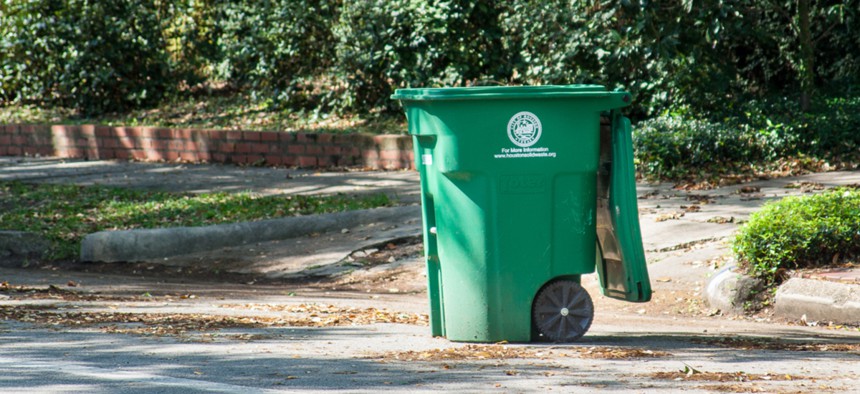Connecting state and local government leaders
A Houston environmental advocate is afraid the problem exposed by a local news investigation will cause residents to take recycling less seriously.
Of the 8.3 billion tons of plastic ever produced, only 9% of it has been recycled. The vast majority of it has ended up in landfills, in part because many jurisdictions still lack recycling programs, consumers are unaware of what can be recycled and what can’t, and, most recently, major challenges in where recycled materials will go for processing.
The city of Houston is under fire for contributing to the problem recently, as an investigation by a local television station from January to April 2019 revealed that over 2.6 million pounds of recycling was improperly handled, sent to landfills instead of treatment centers. That recycling included a mixture of plastic, metal, and paper. The issue was brought to local attention by KHOU-TV this summer, and more recently confirmed by an internal city audit, which found 532 instances of mishandling.
In April, Caroline Wright, the deputy director of solid waste management, wrote in a letter to employees of the department that surveillance footage showed employees dumping recyclables placed in green bins into landfills, a practice she said violates the city’s recycling policies. “Please be advised that failure to adhere to this directive will result in immediate disciplinary action,” she wrote.
Even so, some employees in the department continued the practice, KHOU’s Jeremy Rogalski reported. Four deputy assistant directors are now on two-week suspensions for failing to comply with the order, along with 11 supervisors and 48 truck drivers who have received probation.
Houston City Council Member Michael Kubosh told KHOU that he was shocked the infractions continued after the department reminded employees of its recycling policies. “It’s insane, I just can’t believe this is happening,” he said. “We’ve got to do better. These are core services. This is what government does.”
Representatives from the Solid Waste Department could not be reached after multiple requests for comment. The audit, however, found that “an aging fleet [and a] market area labor shortage of qualified drivers, equipment operators, and mechanics, have led to lengthy workdays” that can make mistakes more frequent.
Harry Hayes, director of solid waste management for the city, wrote in a letter to Mayor Sylvester Turner that new operational practices are “to be established immediately to ensure drivers do not accidentally mix materials when switching trucks or when working to empty trucks.”
The city just opened a new recycling facility in April, which allows glass to once again be recycled, after residents were told to remove it from their green bins in 2016. “I promised residents we would bring glass containers back to curbside recycling bins and I kept that promise,” Turner said in a press release. "My thanks go to residents for their patience, to City Council...and to Director Harry Hayes and his team at Solid Waste.”
Rachel Powers, the executive director of the Citizens’ Environmental Coalition in Houston, said that after touring the new recycling facility as a part of the city’s Solid Waste Advisory Task Force, she was shocked by the recycling contamination rate. Contamination refers to improper recycling of nonrecyclable items or improper cleaning of recyclable items. “The contamination rate was between 30% and 40%, and a target rate is around 5%, so I think it’s clear that people don’t know what to recycle,” she said. “But it’s hard to teach. I’m a recycling vanguard, and I still learn things on a regular basis.”
Green bins in Houston accept things like paper, plastic bottles and jugs, aluminum cans, glass, and waxy cartons from liquids like milk and juice, making for a more comprehensive curbside recycling program than other cities in Texas. The city is also partnering with local groups to recycle electronics like televisions, cell phones, and DVD players, although these items can’t be left for curbside pickup.
But while Houston has expanded its recycling options, the city has struggled to keep up. Houston is the only major city in Texas that doesn’t charge residents a garbage fee, meaning the Solid Waste Department has to compete with other city services, including police, fire, and emergency response, to carve its budget out of the city’s general fund. The city council earlier this year rejected a proposal that would have implemented a garbage fee. Without set revenue coming in from garbage fees each year, it can be difficult to run education campaigns so that residents know what they can recycle.
All this is happening as cities across the country wrestle with a major export problem. China, which had been one of the largest purchasers of recycled materials from the U.S. until recently, determined that the contamination rate is too high and now won’t buy this material. In response, hundreds of cities and towns across the country have canceled or suspended their recycling programs. Los Angeles has closed multiple recycling centers and incinerated over 20,000 tons of plastic this year. Philadelphia, which used to make a profit off recyclables, is now burning half of the recycled materials collected in their city.
Powers said news reports about recycling becoming garbage or being burnt in other cities and Houston’s 2.6 million pound slip-up can discourage people at a time when recycling is needed more than ever. “People have called me and asked, ‘Should I just throw everything in the garbage?’” she said. “It’s unfortunate. We would all benefit from having more people recycle, because most of the time, it will make it to a recycling center.”
Emma Coleman is the assistant editor for Route Fifty.

NEXT STORY: Would AOC's National Rent Control Solve the Housing Crisis, or Make It Even Worse?




